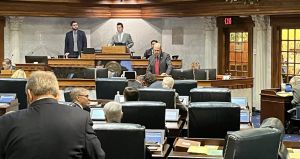State Senate Approves Ban On DEI Offices At Universities, State Agencies

Source: WISH-TV / other
INDIANAPOLIS — A DEI program administrator on Thursday said a ban moving through the legislature would derail efforts to close disparities all over the state.
After more than two hours of heated debate, the state Senate late Thursday afternoon approved a measure to ban diversity, equity and inclusion, or DEI, offices or employees at any state universities or state agencies. The move came less than a month after Gov. Mike Braun signed an executive order terminating DEI efforts in state government and amid a broader national effort by conservatives to dismantle DEI programs.
Bill author Sen. Gary Byrne, R-Byrneville, said DEI itself has become its own form of discrimination. He said DEI programs send the message discrimination is good so long as it’s the right kind of discrimination.
“It pits people against each other and causes people to lose trust that they would be treated fairly,” Byrne said. “The bill is trying to prevent this discrimination at the state level and say that Indiana government must treat all citizens equally.”
Democrats lambasted the bill as a move that would undo decades of progress in the aftermath of the Civil Rights Movement. Sen. La Keisha Jackson, D-Indianapolis, said ongoing disparities in health outcomes, employment, and a host of other measures among women and people of color prove DEI programs are still needed.
“Eliminating DEI is not just a legislative decision, It is a statement,” Jackson said. “It tells our students and our workers in our communities that their experiences do not matter, that their voices are not valued, and their struggles are invisible.”
Senate Minority Leader Shelli Yoder, D-Bloomington, repeatedly pressed Byrne on whether he had consulted any organizations involved in the work of addressing disparities or any members of historically marginalized groups. He replied he had not, and that he “didn’t think we needed to.”
Byrne’s co-author, Sen. Tyler Johnson, R-Leo, said he took issue with the characterization that the bill was drafted without any input from those affected. Without offering specifics, he said he has heard from faculty and students at universities and medical schools who feel they were forced to endorse ideologies they did not subscribe to. Johnson accused Democrats of attempting to sow confusion about the bill by bringing up possible threats to scholarships and cultural centers, none of which he said were mentioned in the bill.
“Our goal here is to remove divisive and discriminatory, top-down manipulative ideology,” Johnson said.
The bill advanced mostly along party lines, with four Republicans–Ron Alting, Eric Bassler, Greg Goode and Greg Walker–joining all Democrats in voting against it. It now heads to the House for further consideration.






















